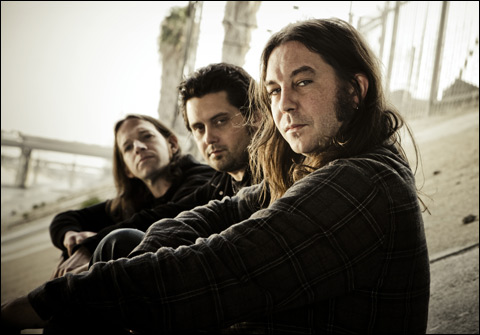
WARRIORS OF METAL: Snakes for the Divine further refines High on Fire’s burliness, as they channel their unchecked aggression into epic tracks of pure rock majesty. |
There are, really, just two types of rock legends: those who try hard to find the rocker within them, and those who are born rockers. The vast majority of those holding guitars and drumsticks on stages are the former: they're the people for whom rock is a choice, one of many options for how they could live their lives. For the born rocker, though, music isn't a fun potential occupation, it's a way of unleashing demons. If that means penning album after album of relentless sludge-thug warfare populated by hordes of orcs, then so be it. And if this sounds like something you can fathom, then congratulations, you may already be familiar with the world of Matt Pike and High on Fire.
I speak with Pike by phone as he's sitting a bar in Rock Island, Illinois, waist deep in a tour that'll bring him and the rest of High on Fire (as well as Kylesa and Torche) to the Middle East this Saturday. It doesn't take long for the topic of his rock perseverance to rear its head. "Basically, I just never quit, even in the face of adversity," he intones casually, as if he'd said it many times before. "I can't lay down and die, because it's the only thing I know how to do — I don't have a choice." That may sound dramatic, but for Pike, it's a matter-of-fact truth: nothing in life matters more than getting on stage and letting loose his dark musical forces.
He began his rock apprenticeship 20 years ago, with the titanic Sleep. Formed from the remnants of San Jose's Asbestosdeath, Sleep would go on to redefine "heavy" for the 1990s. Eschewing the complexity and glamour of '80s metal, they embraced pure, unrelenting sludge, creating a new kind of heavy music as they moved from the monolithic roar of 1993's Holy Mountain to the long-form drone work of their 1999 masterpiece, Jerusalem, an hour-plus journey that attests to the beauty of undiluted amplifier worship.
Jerusalem was the album that destroyed Sleep: their label, London Records, refused to release it, and the ensuing brouhaha split the band in two. Bassist Al Cisneros and drummer Chris Hakius went on to form power duo Om; Pike took the opportunity to reassess his musical goals. First on his list was to frustrate the expectations of fans of stoner rock, a genre that exploded in the wake of bands like Sleep and Kyuss and was notable for downtuned grooves and overt '70s nods. "In Sleep, we were always trying to outrun the stoner-rock tag," he explains. "We were not stoner rock, period — and I definitely wanted to continue to avoid that tag with High on Fire."
Whereas Sleep albums became increasingly more drony and sluggish, High on Fire have with each successive release become faster, more aggressive, more chaotic. Their debut, 2000's Art of Self-Defense, showed that the band had more of a metal kick than Sleep. And that wasn't just due to Pike's new attitude — there was also his partnership with HoF drummer Desmond Kensel. "Des, he was like me, he had been a metalhead in the middle of a punk-rock scene. That's how High on Fire came about — we both wanted to combine, you know, Randy Rhoads with Greg Ginn, and throw in some Tony Iommi."